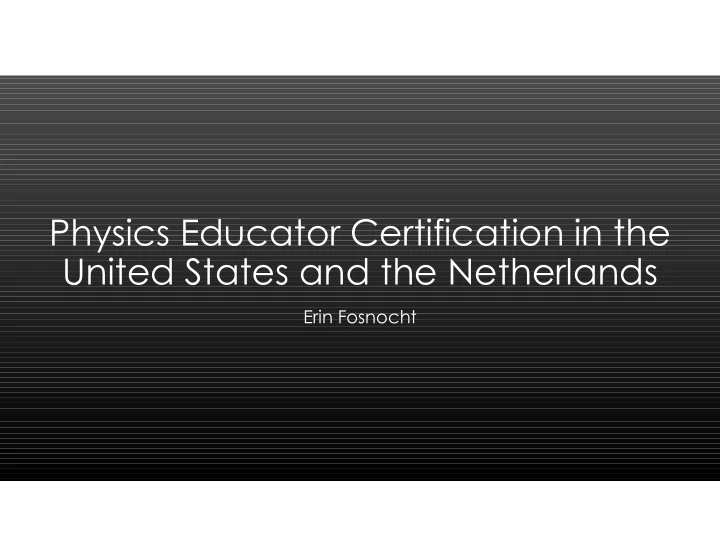

Physics Educator Certification in the United States and the Netherlands United States and the Netherlands Erin Fosnocht
Rendering the Problem: Methods of Physics Education Methods of Physics Education
Conflicting Educational Methods Focus on the Fundamentals Emphasize Real-World Physics Primary Advocates Primary Advocates Primary Advocates Primary Advocates Dutch American Dutch American Curriculum Secondary Curriculum University Reform School Reform Professors Commissions Teachers Commissions
Physics Education in the United States • Mandatory General Science Course • Ages 14-15 • Cursory survey of physics, chemistry, and related topics • High School Physics in Virginia • Not mandatory or encouraged
The Dutch Education System
Physics Education in the Netherlands • Mandatory for all HAVO and VWO Students • Ages 13-15 • Includes theories, formulas, units, and laboratory activities • VWO Science Track • 3 more years of physics • Includes Quantum Mechanics, Relativity, and Particle Physics • Final Examinations • Mandatory for all students • Focus on either formula-based or practical physics
Physics Educator Certification Physics Educator
Netherlands Pathways HAVO, VWO, or Upper-Level VMBO HBO Bachelor of Education of Physics University (WO) Bachelor’s Degree Grade Two Certification Grade Two Certification WO Master of WO Master of Physics with Educational Physics and Education Training Teaching Years 1-3 of HAVO and VWO HBO Master of Education and Physics Grade One Certification Teaching Years 1-6 of HAVO and VWO
Personal Perspectives: Dutch Physics Teachers Dutch Physics Teachers
Ben Groenen Believes that “ideally, [physics should be] linked with other should be] linked with other subjects, but in the higher levels, you must focus on the subject on its own”
Joris de Graaf Tries to strike a balance between doing “cool stuff” in between doing “cool stuff” in class and demonstrating the rigor of upper-level physics
Conclusions Conclusions
Questions?
Recommend
More recommend